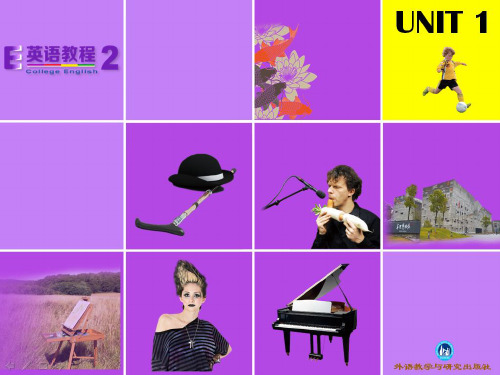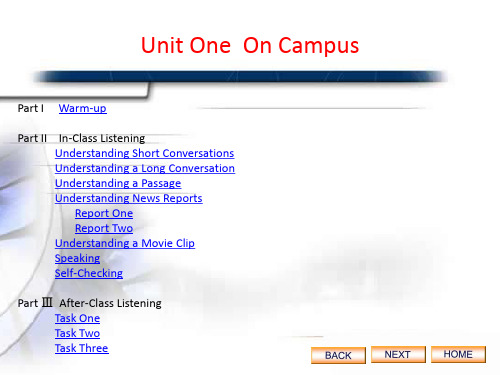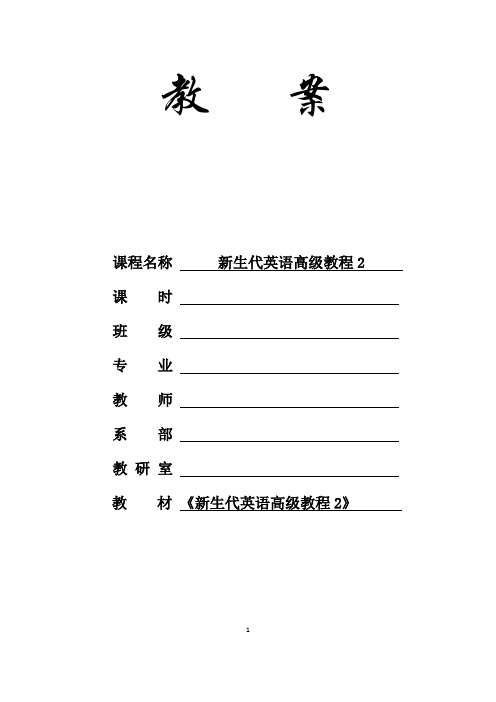E英语教程2Unit1教学内容
E英语教程二Unit-1PPT课件

Grammar
Writing
Listening and speaking
Culture express
Pronunciation and listening skills Conversations Passage
3
Listening and speaking Reading
Grammar
Writing
✔ 1 He has a big office. ✘ 2 He is well-paid. ✔ 3 His boss is open-minded. ✔ 4 His colleagues are helpful. ✘ 5 His job provides good opportunities for promotion. ✘ 6 There is not much pressure at his work.
5
Listening and speaking Reading
Grammar
Writing
Pronouncing fricatives properly
Tips
Culture express
/s/ 和/z/
是齿龈音。发 /s/ 时,舌尖及舌中靠近上齿龈,其间形成 窄缝,气流从窄缝中流出,摩擦成音,但只送气不振动 声带;发/z/ 和发/s/ 时的舌形和口形相同,不同的是发此 音时声带需要振动,但不送气。
companies, which is quite demanding. He’s been working in this company for
3)_o_v_e_r__tw__o__ years. He gets a lot of 4) ____fu_n_____ at work.
E时代大学英语视听说教程2课件及答案 Unit 1On Campus

D. The woman doesn’t think the man is good enough to pass the exam.
5. A. He is getting along well with the woman.
B. He is going to finish his term paper.
adj. giving help; useful 有帮助的
spark one’s interest
激发某人的兴趣
pay close attention to
密切关注
fight the clock
争分夺秒
get a good command of 很好地掌握……
Part II In-Class Listening
2. A. Stay up to prepare for the exam. B. Ask the professor for help. C. Never make preparations until the last moment. D. Have confidence in herself.
Part II In-Class Listening
Understanding a Long Conversation
☆ Vocabulary Band
concerned [kən'sɜːnd] adj. worried; troubled 忧虑的
negative ['negətɪv]
adj. lacking in definite, constructive or helpful
C. He has been busy with a contest.
D. He has great difficulty finishing the term paper.
e英语教程2册unit1课文翻译

When i grow upCrayons danced across sheets of paper to illustrate our dream jobs.彩色蜡笔在纸上飞舞,描绘着我们梦想的工作。
Our drawings were hung in the hall way for our parents to see at Back to School Night.我们的画被挂在走廊里,好让我们的父亲母亲在“返校之夜〞可以看到。
I remember looking down the line and seeing pictures of ballet dancers dancing,firefighters putting out a big fire, and spacemen leaping across the moon— jobs that were seen as typical dreams of five-year-olds.我记得放眼望去,有的画上是正在跳舞的芭蕾舞演员,有的是正在扑灭大火的消防员,有的是正在月球上跳跃行走的宇航员,这些工作都是五岁孩子梦想中的工作。
My picture showed a stick figure with brown hair holding a bottle of orange juiceover something like a counter.我画的是一个留着棕色头发的人物线条,她站在柜台后,手里拿着一瓶橙汁。
Underneath was my hardly readable handwriting: When I grow up, I want to work atthe Market Basket because it would be fun to swipe orange juice across the scannerat the checkout counter.画的下面是我那难以识其余字:长大后,我想在杂货市场工作,因为在收银台旁边用扫描仪扫橙汁的条形码会很幽默。
e英语教程智慧版第二册教案(一)

e英语教程智慧版第二册教案(一)教案:e英语教程智慧版第二册课程概述•课程名称:e英语教程智慧版第二册•总课时数:X课时•课程目标:通过本课程的学习,学生能够提高英语听、说、读、写的能力,掌握基本的语法知识和词汇量,培养学生的英语应用能力。
教学内容第一课:Unit X - Title•学习目标:–了解本单元的主题和内容。
–学习新的词汇和短语。
–学习并掌握相关的语法知识。
–进行口语练习和听力训练。
•教学步骤:1.引入新课:通过话题导入新的单元内容,激发学生学习兴趣。
2.学习词汇和短语:介绍本单元的重点词汇和短语,进行词义理解和例句展示。
3.学习语法知识:教授本单元相关的语法知识,通过例句和练习加深理解。
4.口语练习:组织学生进行口语练习,模拟真实情境,提高口语表达能力。
5.听力训练:进行听力练习,培养学生的听力理解能力。
6.课堂小结:对本节课的重点内容进行总结,并布置相关的课后作业。
第二课:Unit X - Title•学习目标:–复习上节课的内容。
–学习新的词汇和短语。
–继续学习相关的语法知识。
–进行阅读理解和写作练习。
•教学步骤:对知识点的记忆。
2.学习词汇和短语:介绍本单元的新词汇和短语,进行词义理解和例句展示。
3.学习语法知识:继续教授本单元相关的语法知识,通过例句和练习加深理解。
4.阅读理解:组织学生进行阅读理解练习,培养学生的阅读理解能力。
5.写作练习:引导学生进行写作练习,要求学生运用所学的语法知识和词汇进行写作。
6.课堂小结:对本节课的重点内容进行总结,并布置相关的课后作业。
第三课:Unit X - Title•学习目标:–复习上节课的内容。
–学习新的词汇和短语。
–继续学习相关的语法知识。
–进行听力和口语训练。
•教学步骤:对知识点的掌握程度。
2.学习词汇和短语:介绍本单元的新词汇和短语,进行词义理解和例句展示。
3.学习语法知识:继续教授本单元相关的语法知识,通过例句和练习加深理解。
E时代大学英语——阶梯阅读教程2(Unit1)

Passage A
Word Bank
01
Birthday Celebrations Tradition of birthday parties started a long time ago. There are some traditions that you can find almost anywhere, anytime, such as sending birthday cards, blowing out the candles on a birthday cake and singing the Happy Birthday song. Others are only found for certain ages and in certain countries. In China, on a child’s second birthday, family members put many things on the floor around the child. According to Chinese tradition, the first thing that the child picks up tells you what profession1 the child will choose later in life.
C) Sending birthday cards.
D) Eating birthday noodle.
B 2.Who will usually organize a party at children’s special birthday celebration in Japan?
A) Priests.
In many English-speaking countries, a twentyfirst birthday cake often has a key on top, or the cake itself is sometimes in the shape of a key. The key means that the young person is now old enough to leave and enter the family home at any time they want to. (283 words)
新生代英语高级教程2 Unit 1_电子教案

教案课程名称新生代英语高级教程2 课时班级专业教师系部教研室教材《新生代英语高级教程2》12345678910补充教学资源Vocabulary Builder参考译文蒂姆:嗨,希拉里。
这学期你的课程安排如何?希拉里:让我想想,课程表在这儿了。
看起来这学期会很忙。
周二和周四上午有数学课。
周一、周三和周五下午有物理课。
这两门是我的必修课,因为我学的是物理专业。
蒂姆:那选修课呢?你还有其他课程吗?希拉里:有,我有一门罗马史选修课,每周五上午上课。
你呢,蒂姆?你这学期的课程安排如何?蒂姆:简直让我抓狂!每天我都有英语课。
目前我还在上一门关于莎士比亚的课。
他是我最喜欢的作家。
这学期将会很忙。
希拉里:你说的一点儿没错。
Show Time参考译文桑切斯夫人:嗨,亲爱的。
学得怎么样?赫克托:说实话,妈妈,不怎么样。
桑切斯夫人:真的吗?出了什么问题?是漏掉了什么作业吗?赫克托:不是,妈妈。
问题在于这噪音。
噪音太大,我无法集中精力。
桑切斯夫人:哦,抱歉。
但你也知道你老爸,他觉得自己耳背,所以他总是把音量调到最大。
11赫克托:我知道。
只是这让我很难集中精力,仅此而已。
桑切斯夫人:好吧。
我们会尽量把声音调低。
维克托!把电视声音调小点。
你儿子正努力学习呢。
赫克托:喂?娜奥米:是你吗,赫克托?出什么事了?赫克托:没事,只是……刚刚我正在用功学习!娜奥米:好吧,打扰了!今天你过得肯定很糟吧。
赫克托:是的,可以这么说。
我不得不在我家厨房学习。
娜奥米:这是为什么?赫克托:我的父母!他们在看电视的时候喜欢把音量调得很大。
这让我很难集中精力。
娜奥米:听起来你需要一个更安静一点的地方学习。
赫克托:是的,你说的一点儿没错。
娜奥米:去图书馆学习怎么样?赫克托:这个想法不错。
但什么时候去?我的课程可是很多的!娜奥米:我也是。
就是因为这样合理安排时间才变得更加重要。
赫克托:你是怎么做到的?娜奥米:首先,我为自己制定了一个时间表。
赫克托:你做了个时间表写着你在什么时间去什么地点学习?娜奥米:是的,我真的是这么做的。
新生代英语基础教程2 Unit1_电子教案

教案课程名称新生代英语基础教程2课时____________________班级____________________专业____________________教师____________________系部____________________教研室____________________教材《新生代英语基础教程2》FamilyShow Time“Where are you from”ReadingWhy is it called a honeymoonChat TimeThe rest is history.WritingFamily treeGrammarThe possessive ’sMy StoryFamilyHave students look at the picture and askthem to tell you as much as they canabout it.Then, go through the questions andcomplete each answer. In addition, youcan ask a few warm-up questions such as“How many people are in your family”Have the students listen and repeat the words. Use descriptive sentences to teach the family member words. For example, you can say “Your uncle is your mother or father’s brother.” “Your aunt is your mother or father’s sister.” “Your cousin is your uncle or aunt’s child,” and so on. A simple family drawn on the board can often help students to understand this.They may find it interesting to see your family tree, if you don’t min d sharing it with them.For the word frame, you can see that it is something we put around important pictures. You can then ask students if they have any framed photos in the class. You can also teach that we use the words married and single to describe s omeone’s relationship status. Ask “Have you been to a wedding recently” “Who got married”For Tell the students they will hear a conversation between a radio host and a celebrity (Anna). Now listen to the conversation and have students complete the sentences.Correct any mistakes. Have students talk about family members with sentencesthey have learnt.For Exercise D, let students match those Chinese kinship terms to the corresponding English definitions.First, have the students watch the video in its entirety. Ask basic comprehension questions such as, “Who are the main characters in this video” “Where are they” “What are they doing” “Why are they doing that” “How are they doing it”Next, have students take turns in explaining what is happening in each picture.Watch the video. Now look at Exercise B, and ask students to complete the True / False statements.Next, students can complete the dialogue in Exercise C. Have three students read out the dialogue with one student playing the role of Naomi, one as Hector and the other as Mrs. Sanchez. For an extension activity, you can also have the students redo the conversation using information from their family. Finally, have students match the questions to the answers in Exercise D.Review the vocabulary word honeymoon. Ask them to give you examples of where people might go on their honeymoon. Some students may even know where their parents went on honeymoon.Next, read and listen to the text and have the students read each of the True / False statements and choose the correctPut the students in pairs and have them practice talking about where they would like to go on honeymoon. Every two minutes have students stand up and change partners. Do this three or four times, depending on class size.Ask students to draw a poster and fill in some information. Ask students to introduce and advertise their dream honeymoon package to all classmates.Explain to students that they will hear a conversation in which Andrew tells Jenny about his wedding plans. Introduce the key vocabulary words for this conversation.Tell the students to listen carefully and write down what they hear in the blank spaces. If necessary, pause the recording so that students have time to write.Next, have students practice asking about families in pairs, monitoring them while they do so.Now, have students read through the Language Note, teaching the phrase “the rest is history.”For Exercise C, you can divide students into pairs, and ask them to act out the situation. They can take turns playingAsk students to look at the family tree and fill in the names and their occupations. Check their work.Ask students to write names and occupations of their family members as in the example. Remind them of the appropriate form of Chinese names. Have two volunteers write their answers on the board and check their spelling.Teach students to describe their family relations using the sentence pattern in Exercise C.Explain to students that we use the possessive s to describe who owns something. First, write a large ’s on the board. Next, tell the students that we add ’s for when one person owns something. Walk around the class, picking up students’ items and giving examples, such as “This is John’s book”, emphasizing the ’s. Have students echo you and then ask them to try on their own.Then, tell students that for two names, we add ’s to the second name only.After that, you will need to tell students about irregular plurals. Make examples using the most common irregular plurals used with ’s: children, men, women and people, etc.Let students complete the exercises, and then ask them to change books and go through the answers, correcting any mistakes.My Story To improvestudents’ listeningcomprehensionand speakingability through theuse of videoTell students that they will see a video in whichreal people talk about their families.Now, watch the video and have students completethe true or false statements. In some cases, youmay need to pause the video to help the students.Now, have students tell you the answers,correcting any mistakes. Watch the video againand have students write in the missing words,pausing the video if necessary. Check thestudents’ answers, correcting any mistakes.For the discussion section, start by going throughthe model answers in the book, and have studentsrepeat after you. Then, give the students youranswers to the questions. Next, you can haveseveral students give their answers to the class.Finally, have the students discuss the questions inpairs and/or in groups.课后学习设计作业Finish all the exercises in Unit 1.Read the text in this unit again and try tosummarise its content.Interview a family member and write a familydescription for him/her.课后总结与反思补充教学资源VOCABULARY BUILDER参考译文主持人:您正在收听的是诺维奇广播电台,我是主持人艾伦·彼得斯。
新编实用英语综合教程2unit-1-教案

dance in oral English.students will fine tune their listening and comprehensionskills through exercises relating to inviting people out.with invitations, when one wants to accept or does not accept.and a reply to the invitation one gets.Patterns and expressions for talking about invitations:I’dliketoinviteyoutodinner.我想请你吃晚饭。
Why don’t you come and join us for disco?你为什么不和我们一起跳迪斯科?It’s very kind of you to invite me.谢谢你邀请我。
How nice of you! Many thanks.你真好!多谢。
I’dlove to. That wouldbe grea t.我很愿意去。
太好了!Oh, dear, I’m afraid I’m busy tonight. Perhaps tomorrow evening?哦,亲爱的,今晚我很忙。
明晚也许可以吧?Could you make it another time, perhaps next Sunday?你能改个时间吗,下个星期天怎样?It’s very kind of you, but you see I’ll have to prepare for my exam.非常感谢,可你知道我得准备考试。
I’m sorry I can’t, but thank you all the same.真抱歉,我不能去。
可还是要谢谢你。
Wouldyoulike to … ?您愿意…吗?I’dlike toinvite youto …我想邀请你参加…?I would like to know if you could come to …?我想知道你是否能来…May I invite you to …?敬请光临…Wouldit be possible tojoinus for… ?请问你是否能光临…?Would it be convenient to take part in …?请问你是否方便参加…?I was wondering if you would be interested in …?不知你是否有兴趣参加…?Thank you. I’ll be happy to come.谢谢.我很高兴接受你的邀请.I’dlove to. That wouldbe grea t.我很愿意去.太好了.Thank you for invitation.谢谢你的邀请.I’dbe gladtocom e.我很高兴前往.I’d love to, but I can’t come.我很想参加,但是不能来.Thank you for your invitation, but I don’t think I can make it.感谢你的邀请,但我恐怕不能赴约.Unfortunately,I’malready busy that day.很遗憾,我那天事情太多了.It’s very kind of you, but you see I’ll have to prepare for my exam.非常感谢,可你知道我得准备考试。
- 1、下载文档前请自行甄别文档内容的完整性,平台不提供额外的编辑、内容补充、找答案等附加服务。
- 2、"仅部分预览"的文档,不可在线预览部分如存在完整性等问题,可反馈申请退款(可完整预览的文档不适用该条件!)。
- 3、如文档侵犯您的权益,请联系客服反馈,我们会尽快为您处理(人工客服工作时间:9:00-18:30)。
Passage A
“重写!别的同学可以下课。”她瞪了我一眼便出去了。于是,我又写: “我有一天长大了,希望做一个夏天卖冰棒,冬天卖烤红薯的街头小贩, 因为这种职业不但可以呼吸新鲜空气,又可以大街小巷的游走玩耍,更重要 的是,一面做生意,一面可以顺便看看,沿街的垃圾箱里,有没有被人丢弃 的好东西,这……” 第二次作文缴上去,老师划了个大红叉,当然又丢下来叫重写。结果我 只好胡乱写着:“我长大要做医生,拯救天下万民……”。老师看了十分感动, 批了个甲,并且说:“这才是一个有理想,不辜负父母期望的志愿。” 我那可爱的老师并不知道,当年她那一只打偏了的黑板擦和两次重写的 处罚,并没有改悼我内心坚强的信念,这许多年来,我虽然没有真正以拾荒 为职业,可是我是拾着垃圾长大的,越拾越专门,这个习惯已经根深蒂固, 什么处罚也改不了我。当初胡说的什么拯救天下万民的志愿是还给老师保存 了。 (节选)
Passage A
拾荒记 三毛
在我的小学时代里,我个人最拿手的功课就是作文和美术。当时,我们 全科老师是一个教学十分认真而又严厉的女人。她很少给我们下课,自己也 不回办公室去,连中午吃饭的时间,她都舍不得离开我们,我们一面静悄悄 的吃便当,一面还得洗耳恭听老师习惯性的骂人。
我是常常被指名出来骂的一个。一星期里也只有两堂作文课是我太平的 时间。也许老师对我的作文实在是有些欣赏,她常常忘了自己叫骂我时的种 种可厌的名称,一上作文课,就会说:“三毛,快快写,写完了站起来朗 诵。”
----John Lennon
五岁时,妈妈告诉我,人生的关键在于快乐。上学后,人们问我长 大了想成为什么样的人,我写下“快乐”。他们告诉我,我理解错 了题目,我告诉他们,他们理解错了人生。
——约翰·列侬
Passage A
Pre-reading questions
1. Match the interest areas in the left column with the possible careers in the right column.
If you are interested in …
law
sports
then you might like to be a(n) ...
singer/dancer/composer flight attendant (航空服务员) / tour guide
music
programmer/network engineer/ software engineer
E英语教程2Unit1
Agenda
Listening and Speaking Reading – Text 1 Grammar & Writing
Agenda
Listening and Speaking Reading – Text 1 Grammar & Writing
Agenda
Listening and Speaking Reading – Text 1 Grammar & Writing
Passage A
When I Grow Up
Passage A
Pre-reading questions
1. What did you dr And how about now?
2. Do you think you can realize your dream? Why or why not?
Passage A
When I was 5 years old my mother always told me that happiness was the key to life. When I went to school they asked me what I wanted to be when I grew up, I wrote down 'happy'. They told me I didn't understand the assignment, and I told them they didn't understand life
有一天老师出了一个每学期都会出的作文题目,叫我们好好发挥,并且 说:“应该尽量写得有理想才好。”等到大家都写完了,下课时间还有多, 老师坐在教室右边的桌上低头改考卷,顺口就说:“三毛,站起来将你的作 文念出来。”
Passage A
小小的我捧了簿子大声朗读起来。 “我的志愿—— 我有一天长大了,希望做一个拾破烂的人,因为这种职业,不但可以呼 吸新鲜的空气,同时又可以大街小巷的游走玩耍,一面工作一面游戏自由快 乐得如同天上的飞鸟。更重要的是,人们常常不知不觉的将许多还可以利用 的好东西当作垃圾丢掉,拾破烂的人最愉快的时刻就是将这些蒙尘的好东西 再度发掘出来,这······” 念到这儿,老师顺手丢过来一只黑板擦,打到了坐在我旁边的同学,我 一吓,也放下本子不再念了,呆呆的等着受罚。 “什么文章嘛!你······”老师大吼一声。她喜怒无常的性情我早已习惯了, 可是在作文课上对我这样发脾气还是不太常有的。 “乱写!乱写!什么拾破烂的!将来要拾破烂,现在书也不必念了,滚 出去好了,对不对得起父母······”老师又大拍桌子惊天动地的喊。
computers
athlete/personal trainer/bodyguard
traveling
judge / policeman / lawyer
Passage A
When I Grow Up
Passage A
In kindergarten, my class was asked, “What do you want to be when you grow up?” Crayons danced across sheets of paper to illustrate our dream jobs. Our drawings were hung in the hall way for our parents to see at Back to School Night. I remember looking down the line and seeing pictures of ballet dancers dancing, firefighters putting out a big fire, and spacemen leaping across the moon—jobs that were seen as typical dreams of five-year-olds.
